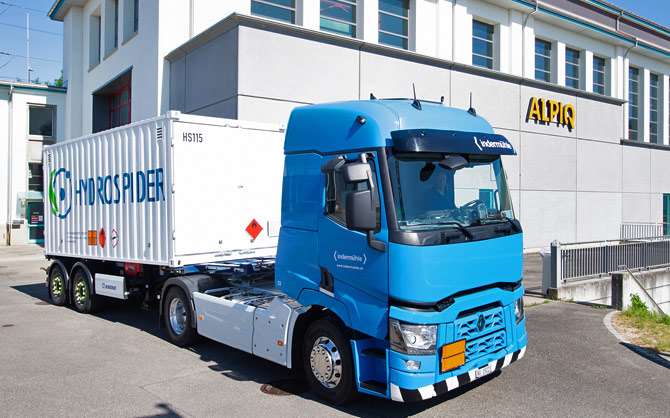Technology
Hydrogen – a CO2-free alternative energy carrier
In order to combat climate change, there is an urgent need for alternative energy carriers that can be generated and used without emitting CO2. Hydrogen is an optimal alternative to fossil fuels, such as petrol and diesel, and contributes to the decarbonisation of road transport and of the heavy industry. Provided that the energy-intensive production process based on electrolysis is carried out using carbon-neutral, renewable electricity.

Hydrogen production using renewable energy sources
As the leading source of renewable energy, hydropower is particularly well suited for hydrogen production. Thanks to their long operating hours, run-of-river power plants enable hydrogen production plants to run with a high degree of utilisation. An optimal balance between hydrogen and electricity generation is key to ensuring that production is economical and that sufficient electricity is available in the grid during critical periods.
In future, hydrogen production will also play a decisive role for other renewable energy sources, such as wind and solar power. Since hydrogen production can take up excess energy, it reduces the need for electricity grid expansions and contributes to the integration of new renewable energies into the energy system.
The advantage of the generated hydrogen is that it is transportable and can thus also be processed into methane or liquid fuels and combustibles regardless of location. Or it can be converted back into electricity and thus complement other storage solutions, such as stationary batteries.
Alpiq and the production of hydrogen
With hydropower in our DNA, we have the best prerequisites for the carbon-neutral production of this alternative energy carrier. Our main focus is on the use of hydrogen for the road transport sector. With our commitment to hydrogen mobility, we are already making a decisive contribution to the evolution of mobility.
In cooperation with H2 Energy and Linde Gas, we also intend to establish hydrogen as an alternative energy carrier, focusing on heavy goods transport. For this purpose, we hold a 45 percent stake in Hydrospider AG. In a cost-efficient manner, the company guarantees hydrogen that fulfils the quality standards of the Society of Automotive Engineers. Hydrospider has completed a 2 MW electrolysis plant at the Gösgen run-of-river power station. This is the first plant of this size in Switzerland to produce hydrogen for commercial operation.
Possible fields of application for hydrogen
In the transport sector, hydrogen is an alternative to fossil fuels. It can be used to power rockets and airplanes or in fuel cells for cars, trucks or ships that use electric propulsion. Its main advantages are its operating range and the fast conventional fuelling process as well as its low resource consumption and weight compared to a battery.
In the industrial sector, hydrogen is applied in various fields: from the long-term storage of large quantities of energy and for emergency power supplies to the synthesis of other energy carriers and fuels and in the refining processes of the chemical industry.